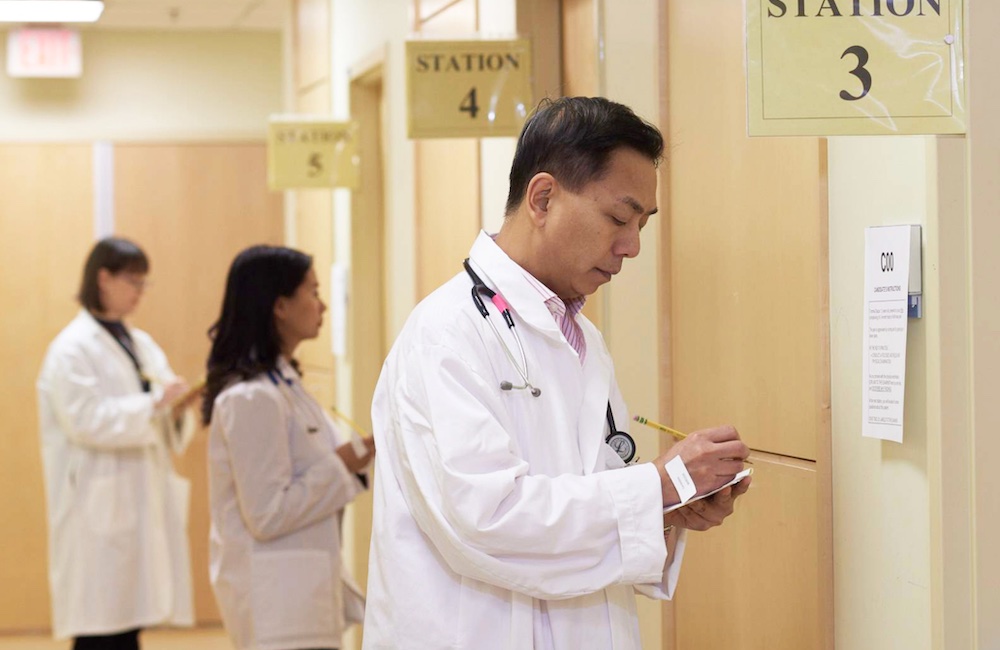As healthcare simulation technology continues to improve, companies across the space continue to develop next-level products that enhance the clinical education experience. For example, the use of artificially intelligent patient simulators has enabled learners to gain learning experiences like never before. One healthcare simulation company contributing to this area of innovation is PCS, the developer of PCS Spark. This HealthySimulation.com article shares how an assistant dean of medical education has incorporated PCS Spark into his university’s curriculum, and the benefits he has witnessed.
A cloud-based speech-recognition-powered artificially intelligent patient communication simulator, PCS Spark was built on the latest machine learning technologies. The platform is powered by the PCS Engine, which delivers conversational AI for patient-provider interview training. The technology can be screen-based or presented in Virtual Reality (VR), leading to authentic natural conversations.
This fluency is extremely important as learners cannot solely rely on drop-down menus with pre-written answers. Adding to the technology’s realism, PCS Spark patients can be of any age, gender or ethnicity. They can also present a diverse range of pathologies and associated symptoms.
Michael Sostok, MD, the Assistant Dean of Medical Education and a Professor of Medicine at the University of Cincinnati College of Medicine explained that his team began using PCS Spark within their Simulation Center three years ago for a variety of formative simulations for medical learners, nursing learners, and Pharm D learners. He shared that they were looking for options to provide simulation opportunities for learners in an asynchronous and location-agnostic fashion Dr. Sostok had researched a variety of products and platforms and found PCS to be the best fit to meet his team’s clinical simulation needs.
“The major benefits include flexibility, access from anywhere with the browser and internet connection, and first-rate customer service responsive to our needs,” he said. “I would recommend this product to any program that can use simulation to develop clinical skills of health care profession learners.”
Dr. Sostok added that his experience working with PCS has been nothing short of “fabulous.” He noted that PCS has always been highly responsive and available to provide the support needed to make the healthcare simulation experience optimal for the university’s learners – especially those not familiar with virtual reality platforms.
“This is the first virtual reality product we have used. It helped to fill a void created by the pandemic shutdowns. It continues to augment our simulation programs, especially for skills development and formative feedback,” Dr. Sostok said. “ We used one of the PCS cases during our capstone high-stakes OSCE for fourth-year students this past summer. This was the first time we used PCS during a summative evaluation event.”
He added that, in the beginning, there were some concerns expressed regarding realism and function (e.g. the avatar correctly answering questions) but that the PCS staff worked to make the avatars more realistic and responsive. With practice, Dr. Sostok’s learners found the product to be good for skills development and formative feedback.
“[PCS Spark] brings simulation to a wider audience, allows for consistent delivery of simulation cases and provides a platform for instructors to customize cases to best fit the unique needs of their learners,” he said. “The one thing that will make this product sustainable is the dedicated PCS team that continually revises and improves the product. As mentioned, they are highly responsive to end-user needs and strive to continually improve the product and its functionality.”
More About PCS Spark
PCS Spark enables clinical learners to develop patient communication skills and empathy, experience a diverse range of simulated patients safely, engage with content remotely, and work in groups for clinical interviews which can be easily customized by clinical faculty. Further, PCS Spark provides instant and automated assessment at the end of each scenario letting learners know which areas they did well in and which need further work.
According to PCS, the Spark platform being based on machine learning allows the system to become “smarter” after every interaction. This means that each and every day PCS Spark patients get to learn more about the patient-learner interaction and are therefore better at responding to clinical interviews.
With each new institution utilizing the platform and each instance of clinical training performed, PCS Spark also gets one step closer to representing the realistic nuances of human communication. Overall, this ever-expanding intelligence translates to better-automated performance assessments for clinical learners. Therefore, instructors are provided with a meaningful perspective about the conversation which took place without requiring a line-by-line read-through.
More About PCS
For some companies, healthcare simulation is not just a market, but a calling that cannot be silenced. This is true for PCS – a company that started in 2015 and has helped revolutionize patient safety. PCS’s AI-driven patient simulation technology includes virtual patients, wearable simulation, and smart manikins. The company developed the first patient simulator with a fully integrated cloud-based AV recording and debriefing system, enabling clinical simulation centers to digitally debrief sessions with ease.
PCS’s story began back in the 1990s when the founders engaged on a journey around patient healthcare simulation and standardized patient methodologies. The team has since worked with some of the most innovative experts in healthcare simulation as they developed disruptive products.
Overall, the PCS.ai platform is the most advanced cloud-based simulation platform. Users can manage all PCS scenarios and medical simulations through an intuitive, easy-to-use web interface. They can author new patient scenarios, automatically assess learning objectives, and enable learner-driven simulation for their learners as well. The PCS Communication engine leverages the latest advances in machine learning and artificial intelligence to constantly improve. Best-in-class speech recognition and speech synthesis combined with custom natural language processing neural networks.








